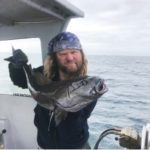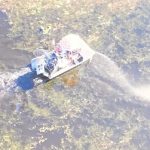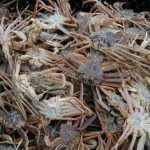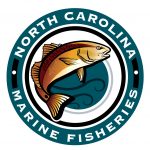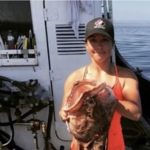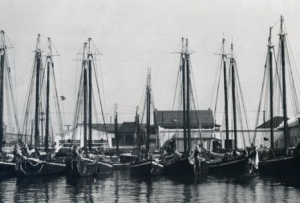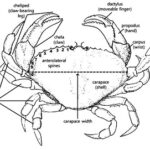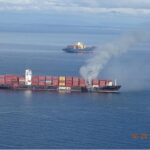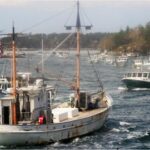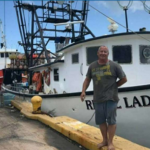Daily Archives: April 6, 2013
N.S. First Nation wins tax exemption on fishing income
The Canadian Press – ESKASONI, N.S. A Nova Scotia First Nation says a move by the Canada Revenue Agency to exempt tax on income earned from fisheries signals a step toward the recognition of aboriginal rights. continued
From the Deckboss
Boot Vince Webster! – Dismal news for Chinook trollers – It’s over – The latest on the Sitka herring fishery – 48 hours in Anchorage – Where do those Chinook come from? – How much would you pay for pollock? As always, read the comments! link![]()
Crab prices unfair, fishermen say – Boats remain tied up to protest crab prices. Their pissed!
 This crab season opened up to a rocky start this week with fishermen upset over the price of crab. Harvesters are angry that the price-setting panel sided with processors in establishing the price at $1.83 per pound. continued Listen to the call in discussion about this issue here with John Furlong and Union Chief Earl McCurty. audio here
This crab season opened up to a rocky start this week with fishermen upset over the price of crab. Harvesters are angry that the price-setting panel sided with processors in establishing the price at $1.83 per pound. continued Listen to the call in discussion about this issue here with John Furlong and Union Chief Earl McCurty. audio here
Bristol Bay Area Plan stirs debate
thebristolbaytimes.com – The controversial Bristol Bay Area Plan is the subject of the meetings. Revision to the plan in 2005 were seen as favoring mining over fish, leading to a lawsuit by Trout Unlimited, Alaska Independent Fisherman’s Marketing Association, and six tribal groups. “DNR ignores past priorities that put fish first,” according to newspaper advertisement by the plaintiffs in last week’s Bristol Bay Times – Dutch Harbor Fisherman. They said the 2005 plan reversed policies dating back to 1967. continued
A Closer Eye on Shellfishing Waters (theres a lot goin’ on in East Hampton)
![]() Attending the March 19 meeting were a number of baymen who spoke in favor of the nine-member panel’s efforts on their behalf, and on behalf of the inshore waters they depend on for their livelihood. Trap fishermen, scallopers, and clammers spoke in favor of the trustees’ charging commercial shellfishermen 75 cents each for the bushel bags that bear the trustee emblem, and for charging for boat moorings as well. “The money goes back to you and the harbors,” said Dan Lester. continued
Attending the March 19 meeting were a number of baymen who spoke in favor of the nine-member panel’s efforts on their behalf, and on behalf of the inshore waters they depend on for their livelihood. Trap fishermen, scallopers, and clammers spoke in favor of the trustees’ charging commercial shellfishermen 75 cents each for the bushel bags that bear the trustee emblem, and for charging for boat moorings as well. “The money goes back to you and the harbors,” said Dan Lester. continued
Seattle Based Organization SeaShare Helps Feed Alaska’s Hungry – video
VAN ZANT: Commercial squid season brings issues
Good news! As of April 1 the commercial squid season is underway. Many recreational fishermen question why that is good news. Personally I have always thought the commercial guys took too many of our fish from the ocean and left we local anglers with much fewer in the bag than we deserve. continued
Georgia Fight over fish now awaits a signature
Times-Union/Jacksonville.com – ATLANTA | A small but determined effort is under way to convince Gov. Nathan Deal to veto legislation that would protect the red drum, or red fish, from commercial fishing. continued
How about some common sense Dr. Hutchings? New data from DFO suggests seals eat twice as many cod.
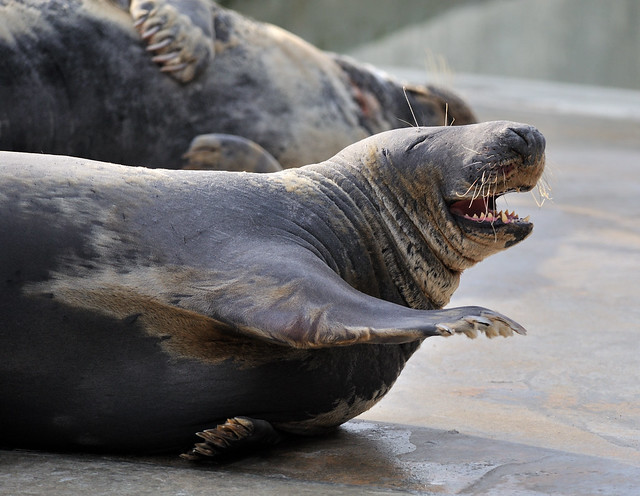 INGONISH — No one is sure yet whether grey seals are continuing to threaten recovery of the cod stocks in the southern Gulf of St. Lawrence, but the seals are there and the fish are not. And new data strongly suggests seals aren’t helping the cod. Seals, eating the softer belly meat and leaving the heads, could be consuming much more cod than figures indicate. Previous data suggested a male grey seal’s diet was up to 24 per cent adult cod. Hamill’s new data suggests adult cod could be up to 60 per cent of the male grey seal’s winter diet. That’s more than double the number that was available to the Senate committee when it recommended a cull. continued
INGONISH — No one is sure yet whether grey seals are continuing to threaten recovery of the cod stocks in the southern Gulf of St. Lawrence, but the seals are there and the fish are not. And new data strongly suggests seals aren’t helping the cod. Seals, eating the softer belly meat and leaving the heads, could be consuming much more cod than figures indicate. Previous data suggested a male grey seal’s diet was up to 24 per cent adult cod. Hamill’s new data suggests adult cod could be up to 60 per cent of the male grey seal’s winter diet. That’s more than double the number that was available to the Senate committee when it recommended a cull. continued
USGS tests potential sites in St. Clair River for new spawning reefs
 Sturgeon, officially classified as threatened in Michigan, are the dinosaurs of the Great Lakes, with their dramatic armoring and slow maturation rates, growing as long as six feet in length and living as long as 150 years in the case of females, which spawn every four years. The USGS has had its eye on the Hart Light site for a while. But the agency’s models – which emphasize river flow and depth – only recently identified Courtright as a potential reef site, said Ireland. The Courtright and Hart Lights are on the Canadian side of the river, but the reefs would be constructed in U.S. waters. continued
Sturgeon, officially classified as threatened in Michigan, are the dinosaurs of the Great Lakes, with their dramatic armoring and slow maturation rates, growing as long as six feet in length and living as long as 150 years in the case of females, which spawn every four years. The USGS has had its eye on the Hart Light site for a while. But the agency’s models – which emphasize river flow and depth – only recently identified Courtright as a potential reef site, said Ireland. The Courtright and Hart Lights are on the Canadian side of the river, but the reefs would be constructed in U.S. waters. continued
Fishing Of Depleted River Herring Banned For 12th Straight Year
The Hartford Courant – The state’s environmental agency has extended its ban on taking alewives and blueback herring from most inland and marine waters in Connecticut for a 12th year. continued
Mass. delegation pushes for Energy Dept. loan for Cape Wind
The entire Massachusetts congressional delegation has written a letter urging the Department of Energy to act quickly on Cape Wind’s loan guarantee application so that the first off-shore wind farm in the country can move forward. continued
Well, what’s it gonna be? Commercial fishing? Or a big gawd damned junk pile loaded with habitat destruction?! It’s one or the other. The phoniest people on this planet are environmentalists and politicians. Neither one of ’em produce a damned thing. Read the comments at the Herald. Not one in support of this fishing destruction boondoggle.
Freshest fish traded in the dead of the NYC night
“This is not like ordering tomatoes or potatoes,” Nunez says. “Seafood is wild.” By 2:30 a.m., one of the key items on his handwritten list of orders — 400 pounds of striped bass — remains unfilled from among dozens of vendors. “I’m getting nervous,” he says. continued
The mysterious elver, from Sargasso Sea to sushi
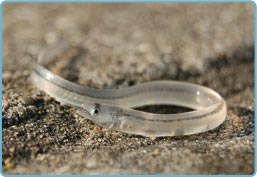 MACHIAS, Maine — Lost in the rhetorical fog of the ongoing economic, political and cultural controversies surrounding the netting of glass eels along Maine’s rugged shoreline is the grim fate that awaits the elvers being harvested. continued
MACHIAS, Maine — Lost in the rhetorical fog of the ongoing economic, political and cultural controversies surrounding the netting of glass eels along Maine’s rugged shoreline is the grim fate that awaits the elvers being harvested. continued
Symposium highlights need for cohesive Arctic management
thebristolbaytimes.com – While a recent Alaska Sea Grant conference focused on changes in Alaska’s Arctic marine life, many of its speakers highlighted a growing need for an Arctic management framework that can better cope with rapid development and climate changes. continued






 For years, poor king salmon returns have forced the closures of subsistence, commercial and
For years, poor king salmon returns have forced the closures of subsistence, commercial and 






























